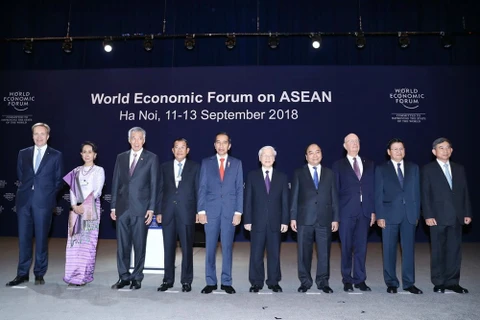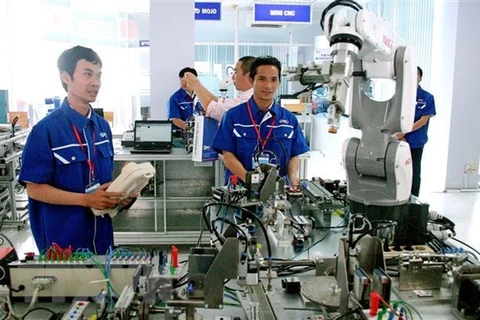Hanoi (VNS/VNA) - Vietnam wants to have at least five billion-dollar tech firms (unicorns) by 2025 and 10 by 2030 as planned in its draft on national strategy on the Fourth Industrial Revolution.
Under the draft announced by the Ministry of Planning and Investment (MPI), the total social investment into research and development (R&D) is expected to account for 1.5 percent of GDP by 2025. Vietnam will be in the top 30 countries in the world in terms of number of patents in the prioritised technology sectors.
In addition, Vietnam targets to have at least five companies by 2025 and 10 firms by 2030 with exports of products and services using Industry 4.0 technologies or next generation such as 5G, Internet of Things (IoT), artificial intelligence and data analysis to G7 countries.
The country wants at least 20 percent of firms to adopt Industry 4.0 by 2025 and 40 percent by 2030.
In prioritised sectors, the rate of businesses applying at least one Industry 4.0 technology will reach 30 percent by 2025 and 50 percent by 2030.
Areas that need to be prioritised in technology transformation are public administration, utilities, healthcare, education, manufacturing, agriculture, logistics, trade, information technology, and finance and banking.
Vietnam needs to rank at least 30th in the Global Innovation Index, it said. The country now ranks 42nd.
To successfully implement the strategy, the draft provides two plans, including renaming the National Steering Committee on economic restructuring and innovating growth model to National Steering Committee for growth and Industry 4.0. It will establish a National Committee on Industry 4.0.
Vietnam is among countries least prepared for the Fourth Industrial Revolution, according to a World Economic Forum report released last year. It ranks low in terms of education, human resources, innovation, and technology – all crucial factors in the revolution – it said.
Regarding economic institutions serving the participation of Industry 4.0, Vietnam's institutional quality is underestimated. Vietnam ranked 94th out of 140 economies on the Institutional Index in the WEF Global Competitiveness Index 4.0 released in 2018.
In terms of technology infrastructure, the country’s 4G foundation has been relatively well developed. In addition, Vietnam has a young and well trained labour force, especially in the information and technology – a foundation for Industry 4.0.
The labour force has been highly valued by global IT firms. They have been an important factor for many Vietnamese IT companies to expand their operations while many foreign businesses have established R&D centres in the country.
However, Vietnam faces a shortage of engineers with management ability.
In recent years, the innovation ecosystem in Vietnam has seen strong development with the participation of start-up incubators. Some start-ups have proved their ability in creating new products and services which were accepted worldwide, using Big Data, AI and other Industry 4.0 technologies to create added-value for customers.
Vietnam has a group of big IT firms. Many leading companies have invested in Industry 4.0 technologies, mainly in cloud computing and data analysis. However, the main revenue of the IT sector came from software outsourcing activities. Meanwhile, companies have been cautious in investing in Industry 4.0 technologies and applying breakthrough ideas.
According to MPI’s calculations, the Fourth Industrial Revolution could bring significant economic benefits.
By 2030, the country’s GDP could grow to 62.1 billion USD depending on the application of technologies, equalling 7 to 16 percent of GDP in comparison with not participating in Industry 4.0.
The revolution was expected to change the job structure of the economy by adding 1.1 to 1.3 million jobs to the country. The labour productivity would be increased by 315-640 USD per labourer by 2030.
Tran Ngoc Thai Son, founder of Tiki – one of largest e-commerce floors in Vietnam – believed that Vietnam would be country of “unicorns” in the next five years.
Investment funds also shared the same idea. Dzung Nguyen, director of Cyber Agent Vietnam - Thailand said the quality of Vietnamese start-ups has improved. Investment funds therefore have paid more attention to the market. Start-ups which could call on capital of several tens of millions of dollars are not far away.
However, businesses said the problem wais that the legal corridor has not kept up with the development of start-ups.
Tran Nguyen Le Van, founder of Vexere.com said when launching the online ticket selling model, he had an ambition of becoming a unicorn in the future. However, he faced challenges of laws and regulations.
Start-up means starting a business with unprecedented models, while the legal framework has not caught up. So it will be difficult for start-ups to see significant development, he said.
Though the Government has commitments to facilitate start-ups in the coming years, firms and investors are still waiting for changes in the legal corridor.
To date, VNG Corporation became Vietnam’s first ever unicorn tech start-up and was valued at 1 billion USD by the World Start-up Report in 2014.-VNS/VNA
Under the draft announced by the Ministry of Planning and Investment (MPI), the total social investment into research and development (R&D) is expected to account for 1.5 percent of GDP by 2025. Vietnam will be in the top 30 countries in the world in terms of number of patents in the prioritised technology sectors.
In addition, Vietnam targets to have at least five companies by 2025 and 10 firms by 2030 with exports of products and services using Industry 4.0 technologies or next generation such as 5G, Internet of Things (IoT), artificial intelligence and data analysis to G7 countries.
The country wants at least 20 percent of firms to adopt Industry 4.0 by 2025 and 40 percent by 2030.
In prioritised sectors, the rate of businesses applying at least one Industry 4.0 technology will reach 30 percent by 2025 and 50 percent by 2030.
Areas that need to be prioritised in technology transformation are public administration, utilities, healthcare, education, manufacturing, agriculture, logistics, trade, information technology, and finance and banking.
Vietnam needs to rank at least 30th in the Global Innovation Index, it said. The country now ranks 42nd.
To successfully implement the strategy, the draft provides two plans, including renaming the National Steering Committee on economic restructuring and innovating growth model to National Steering Committee for growth and Industry 4.0. It will establish a National Committee on Industry 4.0.
Vietnam is among countries least prepared for the Fourth Industrial Revolution, according to a World Economic Forum report released last year. It ranks low in terms of education, human resources, innovation, and technology – all crucial factors in the revolution – it said.
Regarding economic institutions serving the participation of Industry 4.0, Vietnam's institutional quality is underestimated. Vietnam ranked 94th out of 140 economies on the Institutional Index in the WEF Global Competitiveness Index 4.0 released in 2018.
In terms of technology infrastructure, the country’s 4G foundation has been relatively well developed. In addition, Vietnam has a young and well trained labour force, especially in the information and technology – a foundation for Industry 4.0.
The labour force has been highly valued by global IT firms. They have been an important factor for many Vietnamese IT companies to expand their operations while many foreign businesses have established R&D centres in the country.
However, Vietnam faces a shortage of engineers with management ability.
In recent years, the innovation ecosystem in Vietnam has seen strong development with the participation of start-up incubators. Some start-ups have proved their ability in creating new products and services which were accepted worldwide, using Big Data, AI and other Industry 4.0 technologies to create added-value for customers.
Vietnam has a group of big IT firms. Many leading companies have invested in Industry 4.0 technologies, mainly in cloud computing and data analysis. However, the main revenue of the IT sector came from software outsourcing activities. Meanwhile, companies have been cautious in investing in Industry 4.0 technologies and applying breakthrough ideas.
According to MPI’s calculations, the Fourth Industrial Revolution could bring significant economic benefits.
By 2030, the country’s GDP could grow to 62.1 billion USD depending on the application of technologies, equalling 7 to 16 percent of GDP in comparison with not participating in Industry 4.0.
The revolution was expected to change the job structure of the economy by adding 1.1 to 1.3 million jobs to the country. The labour productivity would be increased by 315-640 USD per labourer by 2030.
Tran Ngoc Thai Son, founder of Tiki – one of largest e-commerce floors in Vietnam – believed that Vietnam would be country of “unicorns” in the next five years.
Investment funds also shared the same idea. Dzung Nguyen, director of Cyber Agent Vietnam - Thailand said the quality of Vietnamese start-ups has improved. Investment funds therefore have paid more attention to the market. Start-ups which could call on capital of several tens of millions of dollars are not far away.
However, businesses said the problem wais that the legal corridor has not kept up with the development of start-ups.
Tran Nguyen Le Van, founder of Vexere.com said when launching the online ticket selling model, he had an ambition of becoming a unicorn in the future. However, he faced challenges of laws and regulations.
Start-up means starting a business with unprecedented models, while the legal framework has not caught up. So it will be difficult for start-ups to see significant development, he said.
Though the Government has commitments to facilitate start-ups in the coming years, firms and investors are still waiting for changes in the legal corridor.
To date, VNG Corporation became Vietnam’s first ever unicorn tech start-up and was valued at 1 billion USD by the World Start-up Report in 2014.-VNS/VNA
VNA

























